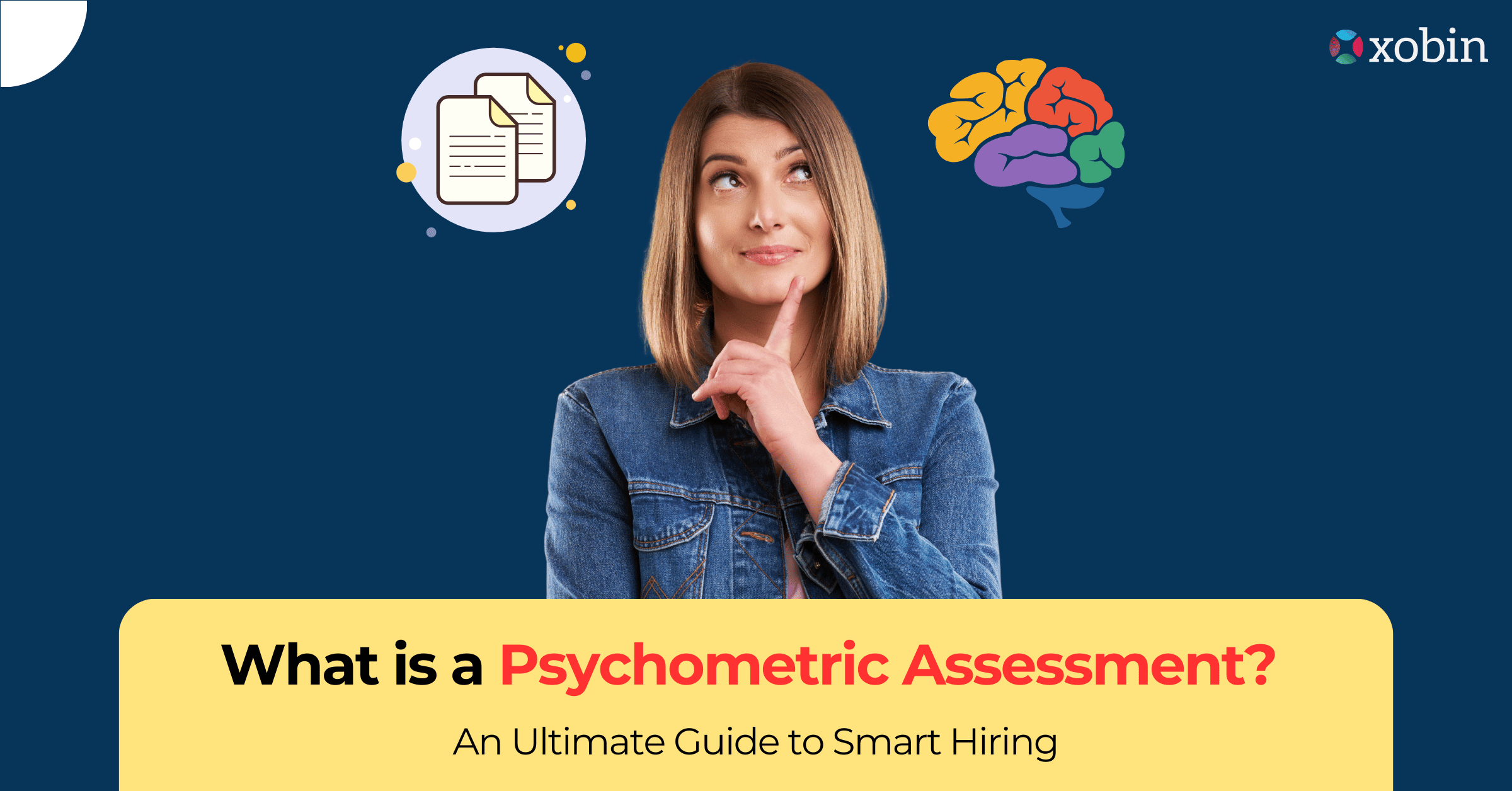Hiring the right candidate can make or break a company’s success. Traditional methods of evaluating candidates, such as reviewing resumes or conducting interviews, often need to uncover critical attributes that truly define job performance. One tool that is valuable in this process is psychometric evaluation. These assessments offer deep insights into candidates’ behavioral traits that help employers make smarter, data-driven hiring decisions. As businesses increasingly adopt this holistic view, psychometric analysis is becoming indispensable in recruitment strategies. Let’s dive in and understand psychometric assessments for smarter, more effective hiring decisions.
Table of Contents
What is a Psychometric Assessment?
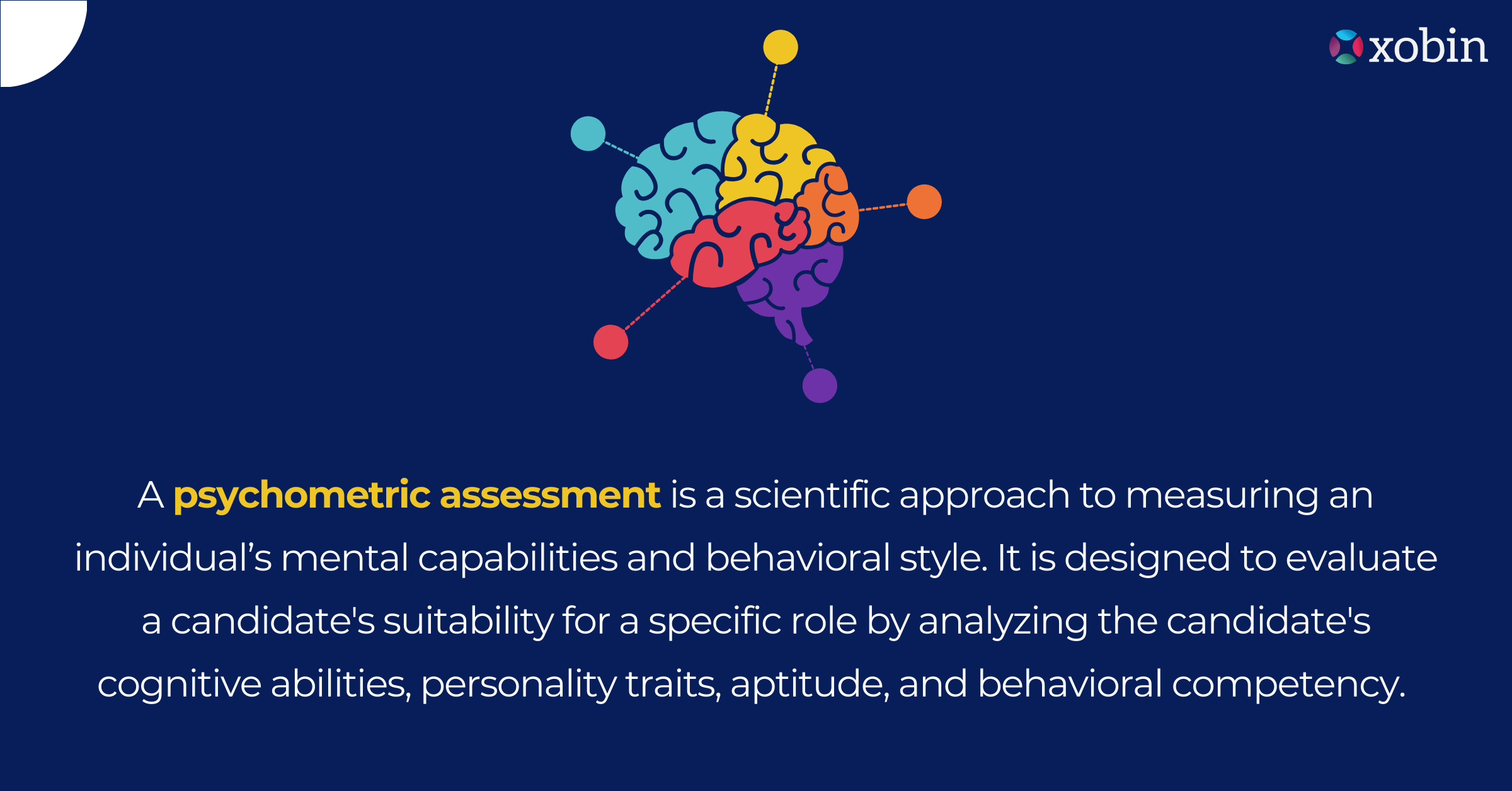
A study by the Chartered Institute of Personnel and Development (CIPD) revealed that 76% of organizations use psychometric assessment as part of their hiring process. Unlike interviews, which can be subjective, Psychometric assessment provide objective data to predict job performance and cultural fit.
Psychometric assessment tests go beyond simply testing a candidate’s knowledge. Employers typically administer these assessments online to evaluate how individuals handle problem-solving, work under pressure or collaborate with others. For instance, a cognitive ability test measures a candidate’s logical reasoning and decision-making skills, while a personality test might assess traits like emotional intelligence or resilience. This combination of cognitive and behavioral data allows employers to make more informed hiring decisions.
Key Areas Assessed by Psychometric Assessment
Psychometric assessments evaluate various areas to give employers a comprehensive view of a candidate’s strengths and potential fit within the organization. Following are a few of the significant areas these tests evaluate:
Cognitive Abilities
One of the primary areas psychometric assessments measure is cognitive ability. This refers to a candidate’s capacity to think, learn and solve problems. Employers often use these tests to gauge critical thinking, reasoning and decision-making abilities. Research shows that 85% of companies assess cognitive skills as a predictor of job performance. A high score in cognitive ability can indicate that a candidate is quick to learn, adapts quickly to new situations, and can handle complex tasks.
Personality Traits
Personality is key in determining how well a candidate aligns with a company’s culture. Psychometric assessments measure extroversion, openness to experience, conscientiousness, emotional stability, and agreeableness. Organizations can gain insights into a candidate’s behavior, teamwork capabilities, and problem-solving approach by analyzing these traits. With the growing importance of cultural fit, nearly 70% of Fortune 500 companies now use psychometric tools to assess job suitability and enhance hiring outcomes.
Emotional Intelligence
Psychometric assessment actively assess emotional intelligence (EQ), a key area for evaluating candidates. EQ refers to a candidate’s ability to understand and manage their emotions and those of others. A high EQ is crucial for leadership, effective teamwork, and resolving conflicts in the workplace. Candidates with vital emotional intelligence handle workplace stress better, communicate clearly, and foster positive relationships. Research shows that individuals with high emotional intelligence outperform others by 20-25% in emotionally demanding roles.
Motivational Factors
Assessing a candidate’s core values and motivators can expose what drives them professionally. Psychometric assessments help determine whether a candidate’s values align with the company’s mission and goals. In fact, data shows that organizations utilizing motivation-based assessments experience a remarkable 22% increase in employee retention. This highlights the importance of ensuring alignment between a candidate’s motivation and organizational values. Such alignment frequently results in higher job satisfaction, increased productivity, and lower turnover rates.
Behavioral Tendencies
Psychometric assessments can also reveal behavioral tendencies, such as how candidates respond to challenges, manage stress, or approach problem-solving. Behavioral tendencies provide more profound insights than traditional interviews, allowing employers to predict how candidates act under pressure or when facing difficult situations. Hence, this predictive insight is beneficial for roles that require resilience, leadership, and the ability to make quick yet informed decisions.
Integrity and Reliability
Psychometric assessments often measure a candidate’s honesty, trustworthiness, and reliability. These qualities are essential for roles that require accountability and ethical decision-making. By evaluating integrity, organizations can avoid hiring individuals prone to misconduct, ensuring a safe and trustworthy work environment.
Different Types of Psychometric Assessments
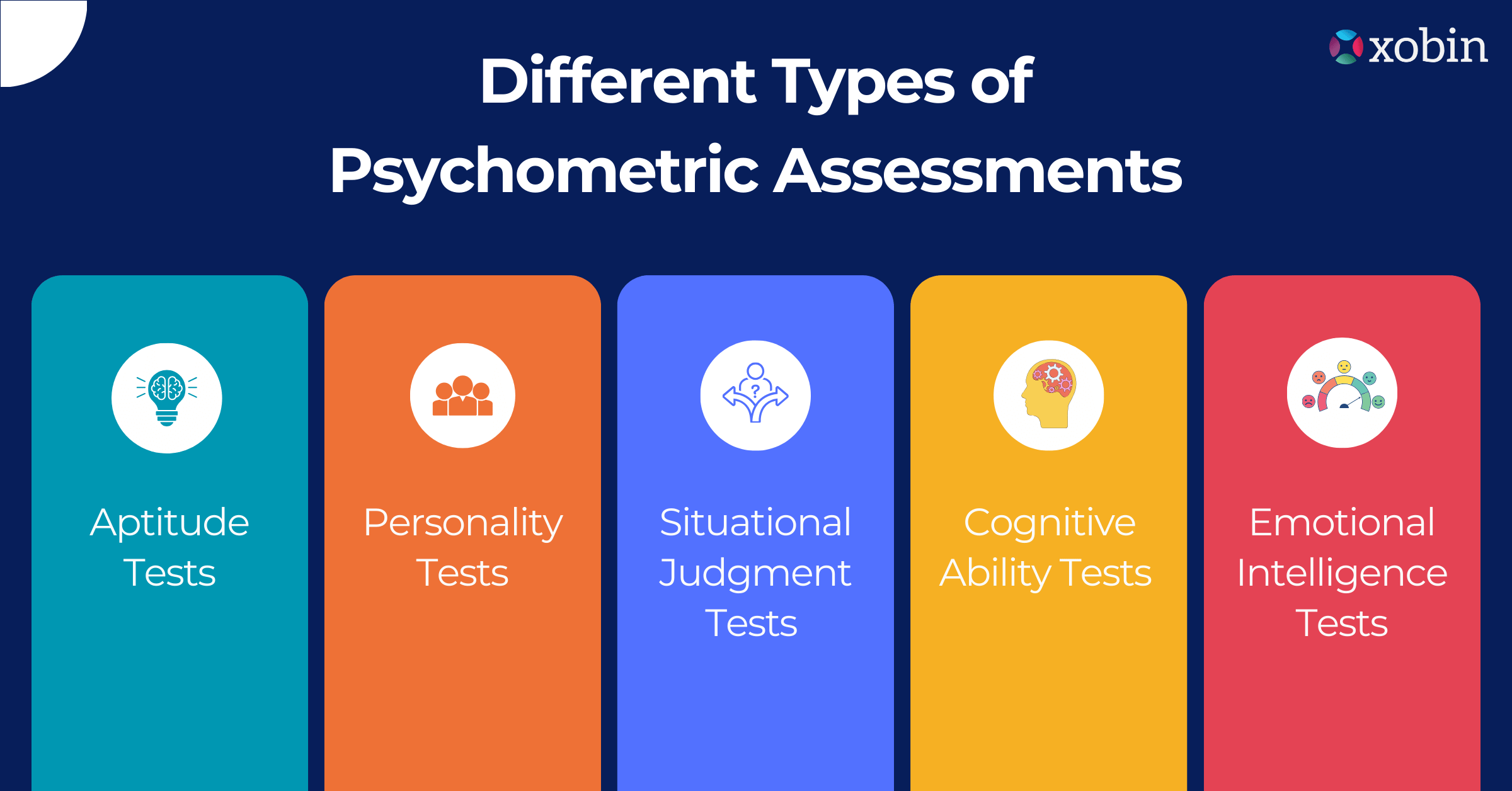
There are several types of psychometric assessment, each tailored to assess a candidate’s capabilities and personality. Here are some common examples:
Aptitude Tests
Aptitude tests are designed to measure an individual’s potential to develop specific skills or knowledge. They focus on specific capabilities that are relevant to job roles. Below are some common types of aptitude tests:
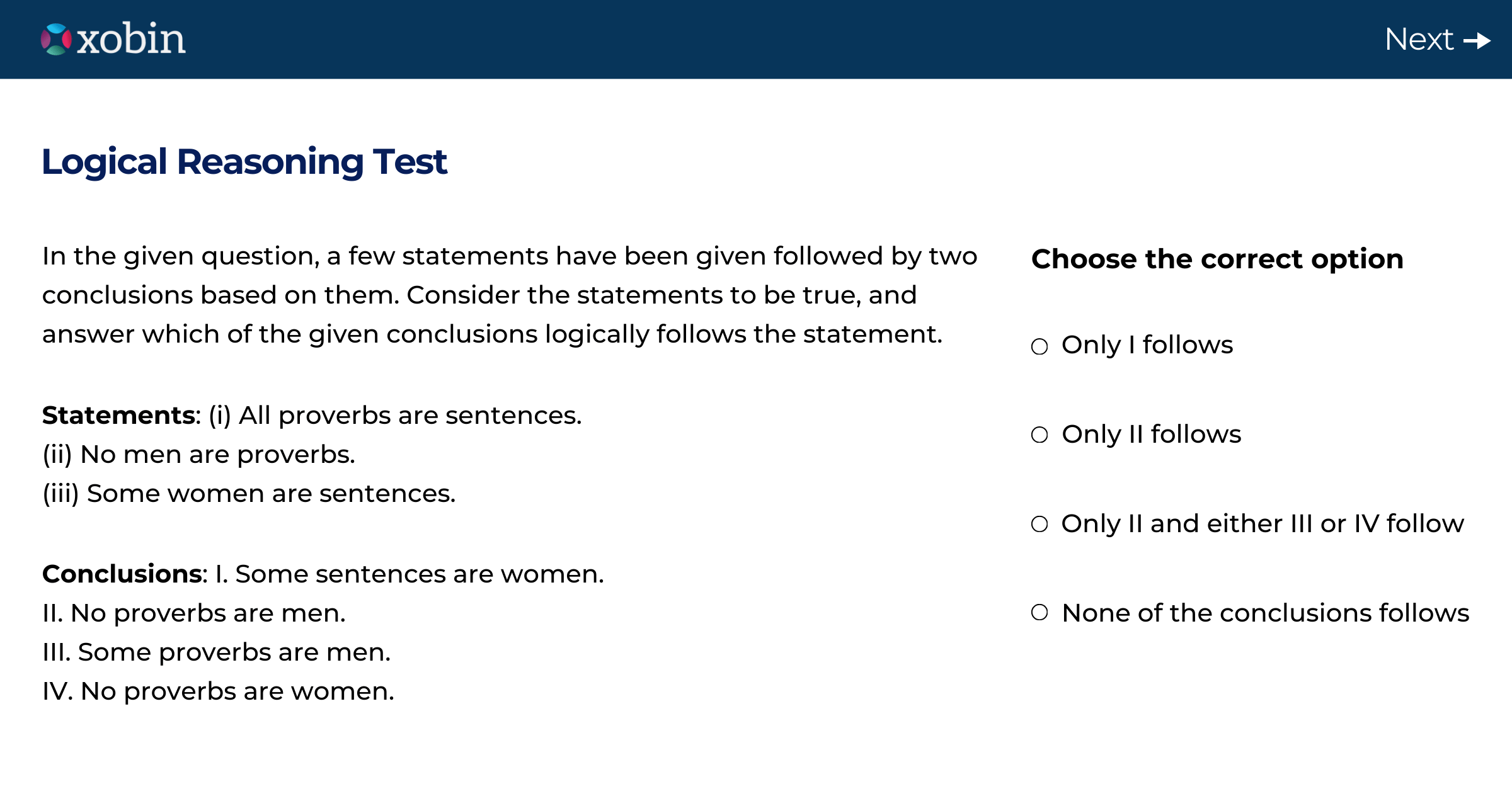
- Numerical Reasoning Test measures the ability to work with numbers and understand quantitative data.
- Verbal Reasoning Test assesses comprehension and communication skills.
- Abstract Reasoning Test evaluates the ability to understand patterns and relationships in data.
- Spatial Reasoning Test measures spatial awareness and the ability to visualize and manipulate objects in space.
- Logical Reasoning Test examines the ability to think logically and solve problems efficiently.
- Mechanical Reasoning Test assesses understanding of mechanical principles and problem-solving in a physical context.
Personality Tests
These tests assess personality traits and how individuals behave in various situations.
- The DISC Test provides valuable insight into how applicants express emotions by analyzing four key behavior types: Dominance (D), Influence (I), Steadiness (S), and Conscientiousness (C). This psychometric tool enhances hiring decisions, improves employee understanding, and boosts team collaboration across various roles.
- The Big 5 (OCEAN) Test evaluates five significant personality traits: Extraversion, Openness, Conscientiousness, Agreeableness, and Emotional Stability. By assessing these traits, you gain deeper insight into your candidates, helping you make more informed hiring decisions.
- 16 Personalities Type Test examines applicants’ cognitive styles, decision-making processes, and lifestyle preferences. This test helps predict how candidates handle stress and conflict, providing valuable foresight into their workplace behavior.
Situational Judgment Tests (SJT)
Situational Judgment Tests evaluate how candidates react to hypothetical work-related scenarios. It measures how individuals approach various situations by presenting them with challenges and asking them to choose the most appropriate response. Here are the standard types of tests included in SJTs:
- Scenario-Based Questions: Presenting candidates with workplace situations and asking them to choose the most appropriate response from a set of options.
- Multiple-choice questions: These present a scenario followed by several potential responses. Test-takers must choose the best option based on the situation.
- Ranking responses: This type asks candidates to rank responses from most to least effective in handling a given scenario.
- Rating scales: Test-takers rate each option on a scale, typically based on its effectiveness in resolving the scenario.
- Ethical Judgment Tests: Ethical dilemmas are presented in these tests to assess how candidates make decisions in situations that involve moral considerations. It helps employers gauge a candidate’s integrity and values.
- Video-based scenarios: Instead of text-based questions, candidates watch a video depicting a scenario and choose their response accordingly.
- Behavioral Consistency Questions: These assess how previous behavior aligns with handling new scenarios, focusing on past actions.
Cognitive Ability Tests
Cognitive ability Tests assess general intelligence, problem-solving ability, and logical thinking. These tests are often used for technical or analytical roles, requiring high-level reasoning and critical thinking. Here are some psychometric assessment examples that pertain to cognitive abilities.
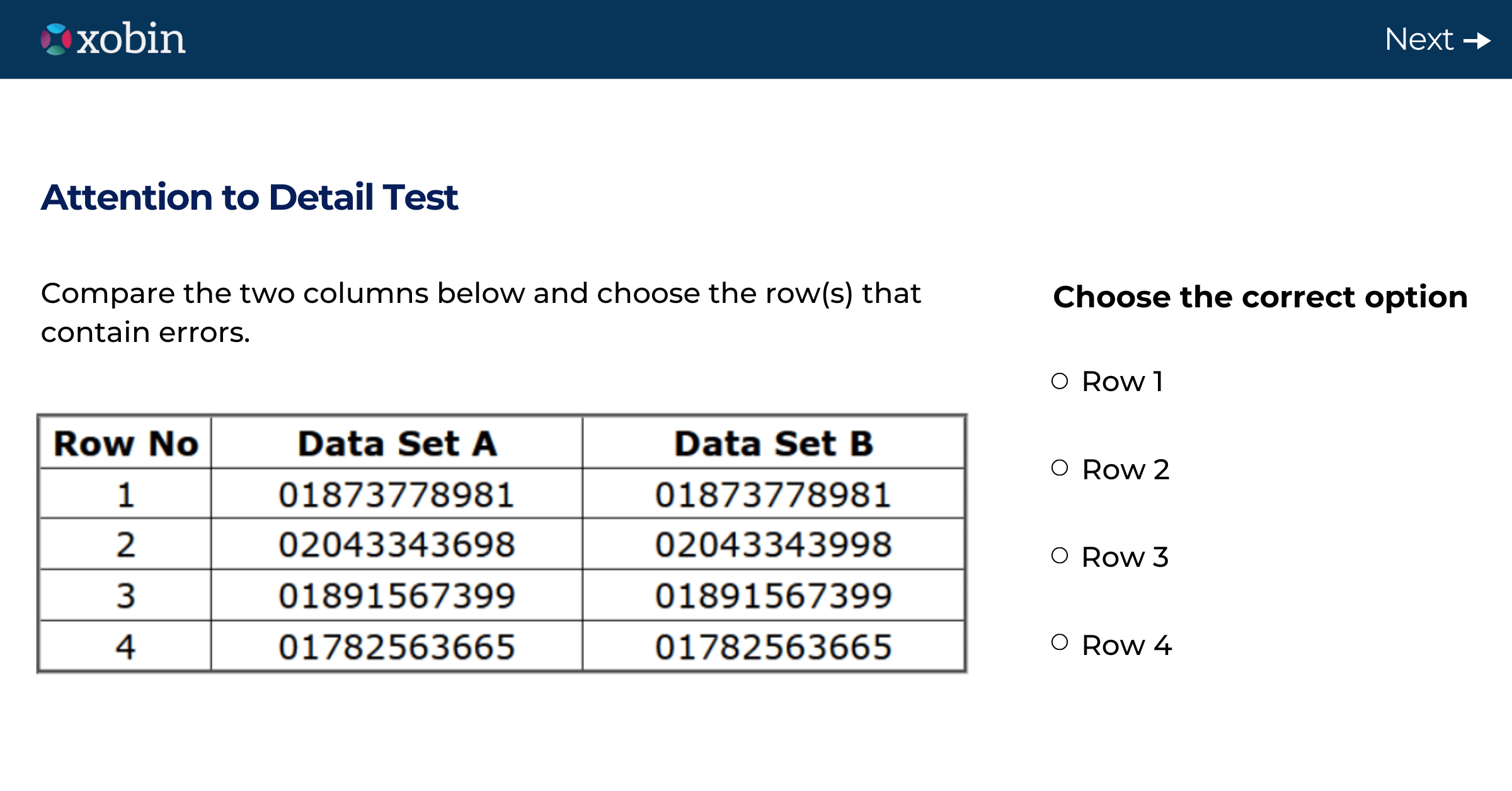
- Memory Tests measure short-term memory and the ability to retain information.
- Critical Thinking Test evaluates a person’s ability to analyze, interpret, and apply reasoning to form reasoned judgments.
- Attention to Detail Tests access accuracy and the ability to focus on specific details.
- Problem-Solving Test evaluates logical thinking and creative problem-solving abilities.
- The Processing Speed Test measures how quickly and efficiently one can process information.
- IQ Test defines a general measure of intelligence that evaluates a variety of cognitive skills.
Emotional Intelligence Test
These tests evaluate a candidate’s ability to recognize and manage emotions, pivotal for teamwork and leadership roles. They focus on measuring various aspects of emotional and social functioning. Key components often assessed include:
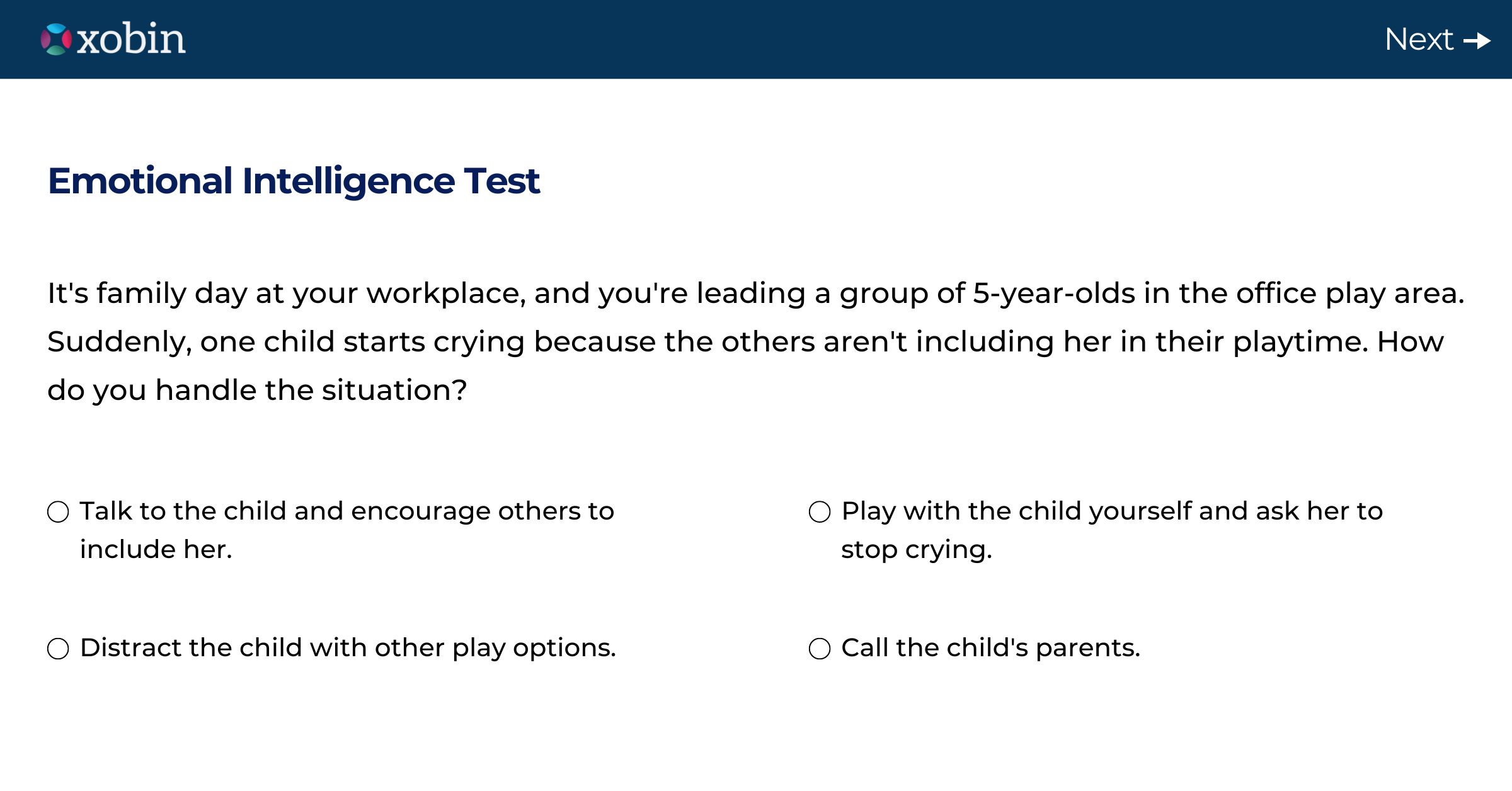
- Self-Awareness determines the ability of an individual to identify and comprehend one’s emotions.
- Self-Regulation measures a person’s capacity for controlling and managing their emotional reactions.
- Motivation evaluate the drive and enthusiasm for achieving goals despite challenges.
- Empathy examine the capacity to understand and relate to the emotions of others.
- Social Skills assesses the ability to build relationships, communicate effectively, and manage social interactions.
Benefits of Using Psychometric Assessment Tests
Psychometric assessments offer several benefits that make them a key tool in the hiring process:
Objectivity and Fairness
Psychometric assessment provides objective data, reducing the biases that may occur during traditional interviews. As a result, employers can make decisions based on measurable criteria rather than relying on intuition or first impressions.
Predictive Job Performance
Research has shown that psychometric assessment tests are predictors of job performance. Specifically, cognitive ability tests strongly correlate with workplace success across various industries. These tests are valuable tools for organizations seeking to hire top talent and improve employee performance outcomes.
Reducing Employee Turnover
Psychometric assessments help reduce turnover by ensuring the right fit between a candidate and the job. Employees who are well-suited for their roles are more likely to stay and contribute positively to the organization.
Enhanced Cultural Fit
Understanding a candidate’s personality traits and behavioral tendencies is crucial for ensuring a good match with the company’s culture. Consequently, psychometric assessment tests enable organizations to assess cultural fit, ultimately enhancing team dynamics and boosting overall employee morale.
Eliminate hiring bias
Psychometric assessment help reduce hiring bias by providing objective, standardized data on a candidate’s abilities and personality, minimizing the influence of subjective opinions. This ensures fairer evaluations and leads to more diverse and performance-based hiring decisions.
Enhancing Diversity and Inclusion
Psychometric assessments enhance diversity and inclusion by providing objective assessments that minimize unconscious biases during hiring. These tests promote a more equitable and diverse workforce by evaluating candidates based on their skills and abilities rather than subjective factors. Consequently, organizations can create a more inclusive and diverse workforce, benefiting from varied perspectives and experiences.
Faster and More Efficient Hiring
Standardized tests enable employers to efficiently narrow down a large pool of candidates, focusing on those most likely to succeed. This approach streamlines the recruitment process and enhances the overall quality of hires. Implementing these assessments in the hiring strategy ultimately helps organizations make informed decisions.
Managing Personality Traits in the Workplace
Psychometric assessments help harmonize personality traits in the workplace by offering insights into individual strengths and behavioral tendencies. This enables employers to align roles with employees’ personalities, fostering better teamwork and reducing conflicts. Therefore, it enhances overall productivity and workplace cohesion.
How Accurate and Reliable are Psychometric Assessments?
The reliability and accuracy of Psychometric assessments have been well-established through extensive research and validation studies. These tests undergo rigorous testing to confirm that they possess the essential psychometric properties and ensure they measure what they claim to measure consistently over time. Furthermore, psychometric assessments are designed to be repeatable, yielding consistent results regardless of external factors, thus making them a trusted tool for informed hiring decisions.
Xobin’s psychometric assessment stands out due to its reliability, precision, and adaptability. Designed with the latest psychometric research, the psychometric assessment tests ensure validity and reliability, making the results accurate and dependable. The platform uses advanced algorithms to evaluate cognitive and behavioral traits, offering a comprehensive view of each candidate. Moreover, Xobin’s tests are customizable, allowing employers to tailor assessments to their specific needs, whether hiring for technical roles or leadership positions. This flexibility ensures that employers evaluate the right traits for the right roles, ultimately enhancing hiring outcomes and minimizing the risk of mismatches.
However, it’s important to note that no assessment is 100% foolproof. The accuracy of psychometric evaluation depends on proper administration and interpretation. Psychometric assessment offer a comprehensive view of a candidate’s abilities when used alongside other evaluation methods, such as interviews and background checks.
How to Leverage Psychometric Assessment for Better Hiring Decisions?
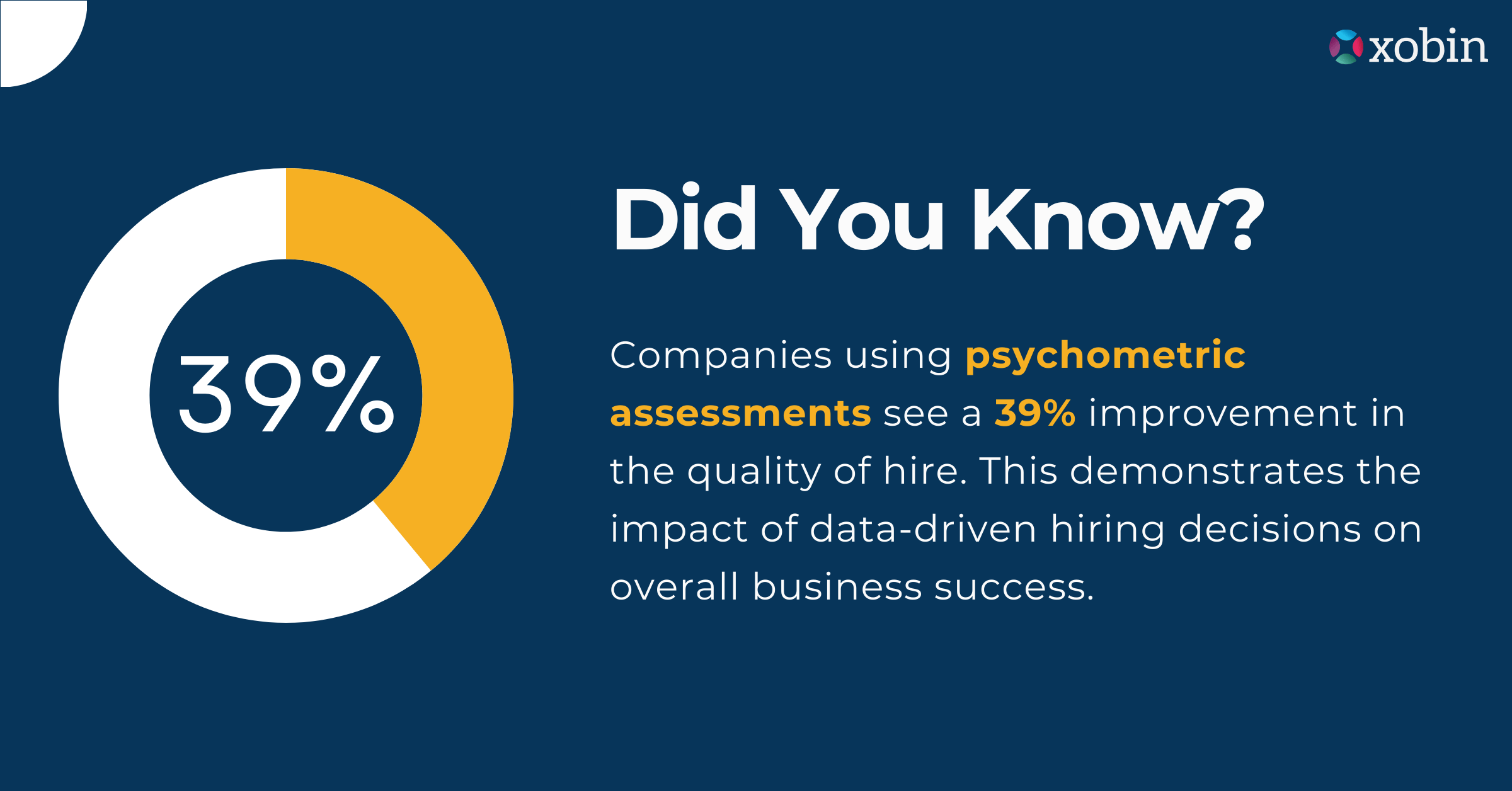
Psychometric tests in the recruitment process can be highly effective when used correctly. Here’s how you can leverage these tests for better hiring decisions:
Align Assessments with Job Requirements
Select an online psychometric assessment that matches the critical competencies required for the role. For example, use cognitive tests for roles requiring problem-solving and reasoning and personality assessments for roles emphasizing teamwork or leadership.
Combine with Traditional Interviews
Psychometric assessments offer valuable insights, but pairing them with structured interviews ensures a more holistic evaluation. Use the test results to guide interview questions and focus on areas where the candidate may need further exploration.
Customize for Each Role
Not all roles require the same traits. Customize psychometric assessments to evaluate the specific abilities and characteristics needed for your hiring position. For instance, a leadership role may require strong emotional intelligence and decision-making skills, while a data analyst role might focus more on cognitive abilities.
Provide Clear Test Instructions
To ensure accurate results, candidates must understand the purpose and format of the test. Offer clear instructions to avoid misunderstandings that could affect performance.
Use Results for Team Building
Psychometric assessments help managers build well-rounded teams by identifying each member’s strengths and weaknesses. By understanding these traits, managers can create balanced teams with complementary skills that enhance overall performance.
What Employers Seek in Psychometric Assessment Results?
Employers look for several specific insights from psychometric assessments that align with the particular demands of the role, including:
- Cultural Fit: Personality tests help employers determine whether a candidate’s values and work style align with the organizational culture. For instance, candidates scoring high in collaboration and teamwork often thrive in companies that prioritize these traits.
- Role-Specific Competencies: Cognitive ability tests enable employers to evaluate a candidate’s problem-solving skills, which are essential for the role. For example, a marketing manager must showcase analytical abilities to succeed.
- Leadership Potential: Personality screening tests can reveal traits such as emotional intelligence and resilience, key indicators of leadership potential.
Employers look for specific traits in a candidate’s psychometric assessment results to reduce the chances of making a bad hire. These assessments help them identify all the critical qualities required for the job. They seek candidates who possess the necessary technical skills and demonstrate traits that align with company values. Through psychometric assessment, it becomes easier to determine if a candidate has the right attitude, motivation, and ability to adapt, which leads to better hiring decisions. Subsequently, this process improves employee retention and productivity while reducing the cost of hiring mistakes.
Improve Talent Hiring with Xobin’s Psychometric Assessments!
Xobin’s psychometric testing software offers intrusive features, making it an excellent tool for improving hiring. The customizable assessments allow employers to tailor tests to the specific skills and traits they need to assess. With real-time insights Xobin enable quicker decision-making and reduces the time to hire.
Moreover, Xobin employ advanced proctoring features to maintain test integrity, prevent cheating, and provide accurate results. Xobin enhances this process by offering reliable, customizable, and insightful assessments, making talent acquisition efficient and more transformative!
“Incorporating psychometric Assessment tests into your hiring strategy is no longer optional in today’s competitive landscape; it’s essential for smarter, more successful hiring decisions.“
